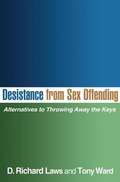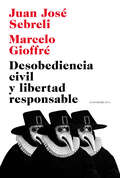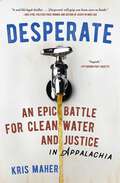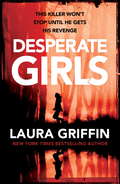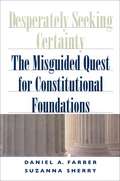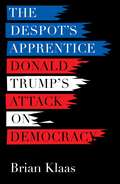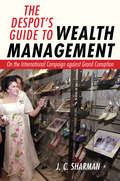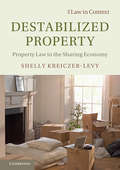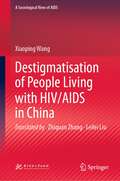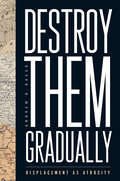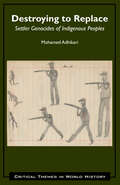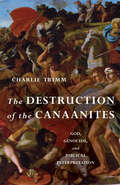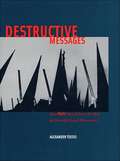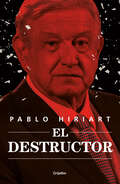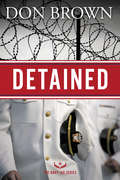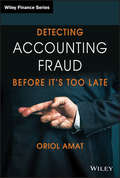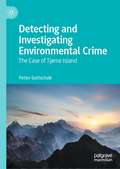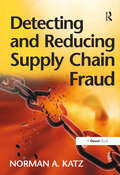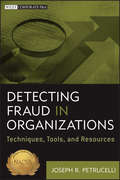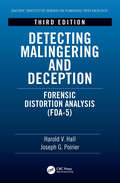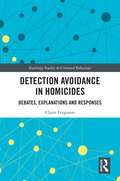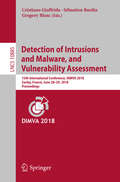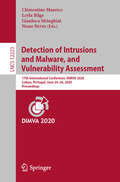- Table View
- List View
Desistance from Sex Offending
by Tony Ward D. Richard LawsThis book offers a fresh perspective on treating a population that is often demonized by policymakers, the public, and even clinicians. The authors argue that most sex offenders are "people like us," with the potential to lead meaningful, law-abiding lives if given a chance and appropriate support. They describe an empirically and theoretically grounded rehabilitation approach, the Good Lives Model, which can be integrated with the assessment and intervention approaches that clinicians already use. Drawing on the latest knowledge about factors promoting desistance from crime, the book discusses how encouraging naturally occurring desistance processes, and directly addressing barriers to community reintegration, can make treatment more effective and long lasting.
Desobediencia civil y libertad responsable
by Juan José Sebreli Marcelo GioffréReflexión erudita, testimonio urgente y alegato políticamente poderoso de Sebreli que, al cumplir noventa años, en plena pandemia del Covid-19, habiéndose contagiado y recuperado, rescata el concepto clásico de desobediencia civil y lo propone como modo de resistencia responsable a los atropellos a la libertad y de defensa de la democracia. 28 de mayo de 2020: en el marco de una entrevista televisiva, Juan José Sebreli introduce la idea de desobediencia civil, concepto clásico de la filosofía política del siglo XIX, como posible respuesta a la cuarentena impuesta por el gobierno de cara a la pandemia del Covid-19. En la serie de reacciones heterogéneas que desencadenó esa mención debe buscarse el origen de estas páginas. La falsa antinomia entre salud y economía es solo una de las muchas formas en que se enmascara una creciente vocación autoritaria que es necesario enfrentar. Este libro postula una tesis tan audaz como indispensable: que el atropello a las libertades individuales habilita a los ciudadanos a un tipo de resistencia a la ley que, ejercida de modo responsable, público y no violento, lejos de debilitar las instituciones las enriquece y estabiliza. Ensayo filosófica e historiográficamente erudito, testimonio reflexivo y urgente, y alegato necesariamente político -por esas razones poderoso y valiente artefacto en defensa de la democracia-, Desobediencia civil y libertad responsable se publica en ocasión del nonagésimo cumpleaños de Sebreli.
Desperate: An Epic Battle for Clean Water and Justice in Appalachia
by Kris MaherSet in Appalachian coal country, this &“superb&” (Pittsburgh Post-Gazette) legal drama follows one determined lawyer as he faces a coal industry giant in a seven-year battle over clean drinking water for a West Virginia community.For two decades, the water in the taps and wells of Mingo County didn&’t look, smell, or taste right. Could the water be the root of the health problems—from kidney stones to cancer—in this Appalachian community? Environmental lawyer Kevin Thompson certainly thought so. For seven years, Thompson waged an epic legal battle against Massey Energy, West Virginia&’s most powerful coal company, helmed by CEO Don Blankenship. While Massey&’s lawyers worked out of a gray glass office tower in Charleston known as &“the Death Star,&” Thompson set up shop in a ramshackle hotel in the fading coal town of Williamson. Working with fellow lawyers and a crew of young activists, Thompson would eventually uncover the ruthless shortcuts that put the community&’s drinking water at risk. Retired coal miners, women whose families had lived in the area&’s coal camps for generations, a respected preacher and his brother, all put their trust in Thompson when they had nowhere else to turn. Desperate is a masterful work of investigative reporting about greed and denial, &“both a case study in exploitation of the little guy and a playbook for confronting it&” (Kirkus Reviews). Maher crafts a revealing portrait of a town besieged by hardship and heartbreak, and an inspiring account of one tenacious environmental lawyer&’s mission to expose the truth and demand justice.
Desperate Girls: A nail-biting thriller filled with shocking twists
by Laura GriffinOne of Publishers Weekly Best Books of 2018!'Desperate Girls is a nail-biting read from the very first page to the final, shocking twist. I could not put this book down' Melinda Leigh'Griffin pulls out all the stops in a phenomenal twist ending that will leave readers stunned' Publishers WeeklyFrom New York Times bestselling author Laura Griffin comes a tightly wound, fast-paced romantic thriller that follows a desperate woman on the run as she hides from a killer's symbolic revenge spree. Perfect for fans of Karen Rose, Alexandra Ivy and Kendra Elliot.Defense attorney Brynn Holloran is right at home among cops, criminals, and tough-as-nails prosecutors. With her sharp wit and pointed words, she's a force to be reckoned with in the courtroom, but in her personal life, she's a mess.When a vicious murderer she once helped prosecute resurfaces and starts a killing spree to wipe out those who put him behind bars, one thing becomes clear: Brynn needs to run for her life.Turning to a private security firm for protection, Brynn can't resist getting involved in the investigation. As the clock ticks down on a manhunt, Brynn's desperate search for the truth unearths long-buried secrets and reignites a killer's cold fury.
Desperately Seeking Certainty: The Misguided Quest for Constitutional Foundations
by Daniel A. Farber Suzanna SherryIrreverent, provocative, and engaging, Desperately Seeking Certainty attacks the current legal vogue for grand unified theories of constitutional interpretation. On both the Right and the Left, prominent legal scholars are attempting to build all of constitutional law from a single foundational idea. Dan Farber and Suzanna Sherry find that in the end no single, all-encompassing theory can successfully guide judges or provide definitive or even sensible answers to every constitutional question. Their book brilliantly reveals how problematic foundationalism is and shows how the pragmatic, multifaceted common law methods already used by the Court provide a far better means of reaching sound decisions and controlling judicial discretion than do any of the grand theories.
The Despot's Apprentice: Donald Trump's Attack on Democracy
by David Talbot Brian Klaas”[A] primer on the threat to democracy posed by—and I can’t believe I’m saying this—the current president of the United States.”—David Litt, New York Times bestselling authorDonald Trump isn’t a despot. But he is increasingly acting like The Despot’s Apprentice, an understudy in authoritarian tactics that threaten to erode American democracy, including:Attacking the pressThreatening rule of law by firing those who investigate his alleged wrongdoingsUsing nepotism to staff the White Houseand countless other techniquesDonald Trump is borrowing tactics from the world’s dictators and despots. Trump’s fascination with the military, his obsession with his own cult of personality, and his deliberate campaign to blur the line between fact and falsehood are nothing new to the world of despots. But they are new to the United States. With each authoritarian tactic or tweet, Trump poses a unique threat to democratic government in the world’s most powerful democracy.At the same time, Trump’s apprenticeship has serious consequences beyond the United States. His bizarre adoration and idolization of despotic strongmen—from Russia’s Putin, to Turkey’s Erdogan, or to the Philippines’ Duterte—has transformed American foreign policy into a powerful cheerleader for some of the world’s worst regimes.In The Despot’s Apprentice, an ex-US campaign advisor who has sat with the world’s dictators explains Donald Trump’s increasingly authoritarian tactics and how Trump uniquely threatens American democracy... and how to save it from him.
The Despot's Guide to Wealth Management: On the International Campaign against Grand Corruption
by J. C. SharmanAn unprecedented new international moral and legal rule forbids one state from hosting money stolen by the leaders of another state. The aim is to counter grand corruption or kleptocracy ("rule by thieves"), when leaders of poorer countries—such as Marcos in the Philippines, Mobutu in the Congo, and more recently those overthrown in revolutions in the Arab world and Ukraine—loot billions of dollars at the expense of their own citizens. This money tends to end up hosted in rich countries. These host states now have a duty to block, trace, freeze, and seize these illicit funds and hand them back to the countries from which they were stolen. In The Despot's Guide to Wealth Management, J. C. Sharman asks how this anti-kleptocracy regime came about, how well it is working, and how it could work better. Although there have been some real achievements, the international campaign against grand corruption has run into major obstacles. The vested interests of banks, lawyers, and even law enforcement often favor turning a blind eye to foreign corruption proceeds. Recovering and returning looted assets is a long, complicated, and expensive process.Sharman used a private investigator, participated in and observed anti-corruption policy, and conducted more than a hundred interviews with key players. He also draws on various journalistic exposés, whistle-blower accounts, and government investigations to inform his comparison of the anti-kleptocracy records of the United States, Britain, Switzerland, and Australia. Sharman calls for better policing, preventative measures, and use of gatekeepers like bankers, lawyers, and real estate agents. He also recommends giving nongovernmental organizations and for-profit firms more scope to independently investigate corruption and seize stolen assets.
Destabilized Property: Property Law in the Sharing Economy (Law in Context)
by Shelly Kreiczer-LevyThe sharing economy challenges contemporary property law. Does the rise of access render our conception of property obsolete? What are the normative and theoretical implications of choosing casual short-term use of property over stable use? What are the relational and social complications of blurring the line between personal and commercial use of property? The book develops a novel conceptualization of property in the age of the sharing economy. It argues that the sharing economy pushes for a mobile and flexible vision of engaging with possessions and, as a result, with other people. Property's role as a source of permanence and a facilitator of stable, long-term relationships is gradually decreasing in importance. The book offers a broad theoretical and normative framework for understanding the changing landscape of property, provides an institutional analysis of the phenomenon, discusses the social, communal, and relational implications of these changes, and offers guidelines for law reform.
Destigmatisation of People Living with HIV/AIDS in China (A Sociological View of AIDS)
by Xiaoping WangAfter reviewing related theories on stigmatisation of people living with HIV/AIDS (PLWHA), this book applies social exclusion theory, actor theory and stigma theory to the study of social mechanisms of stigmatisation of PLWHA in China to show the influence and mechanism of stigmatisation on them, and tries to construct the policy framework to tackle stigmatisation from the perspective of welfare pluralism. Qualitative analysis was used and data was obtained during the field interview. Thirty PLWHA and seventeen healthy people (non-infected people and staff of ASO Service Organizations) were selected by using random sampling and snowball sampling for semi-structured depth interviews. The research examines the treatments and living conditions of those PLWHA, aiming to explore the influence of HIV on them in education, employment, medical care, economy, welfare and social relations. The book is intended for graduate students, researchers interested in this field and relevant policymakers.
Destroy Them Gradually: Displacement as Atrocity (Genocide, Political Violence, Human Rights)
by Andrew R. BassoPerpetrators of mass atrocities have used displacement to transport victims to killing sites or extermination camps to transfer victims to sites of forced labor and attrition, to ethnically homogenize regions by moving victims out of their homes and lands, and to destroy populations by depriving them of vital daily needs. Displacement has been treated as a corollary practice to crimes committed, not a central aspect of their perpetration. Destroying Them Gradually examines four cases that illuminate why perpetrators have destroyed populations using displacement policies: Germany’s genocide of the Herero (1904–1908); Ottoman genocides of Christian minorities (1914–1925); expulsions of Germans from East/Central Europe (1943–1952); and climate violence (twenty-first century). Because displacement has been typically framed as a secondary aspect of mass atrocities, existing scholarship overlooks how perpetrators use it as a means of executing destruction rather than a vehicle for moving people to a specific location to commit atrocities.
Destroying to Replace: Settler Genocides of Indigenous Peoples (Critical Themes in World History)
by Mohamed Adhikari"This book explores settler colonial genocides in a global perspective and over the long durée. It does so systematically and compellingly, as it investigates how settler colonial expansion at times created conditions for genocidal violence, and the ways in which genocide was at times perpetrated on settler colonial frontiers. This volume will prove invaluable to teachers and students of imperialism, colonialism, and human rights."—Lorenzo Veracini, Swinburne University of Technology, and author of The World Turned Inside Out: Settler Colonialism as a Political Idea
The Destruction of Palestine Is the Destruction of the Earth
by Andreas MalmMalm unearths the shared roots of colonial adventurism in Palestine and fossil fuelled warfare.Israel&’s pulverization of Gaza since October 7, 2023 is not only a humanitarian crisis, but an environmental catastrophe. Far from the first event of its kind, the devastation Israel has inflicted on Palestine since October 2023 has merely ushered in a new phase in a long history of colonization and extraction that reaches back to the nineteenth century. In this urgent pamphlet, Andreas Malm argues that a true understanding of the present crisis requires a longue durée analysis of Palestine's subjugation to fossil empire. Returning to the British empire&’s first use of steam-power in war, in which it destroyed the Palestinian city of Akka, Malm traces the development of Britain&’s fossil empire and shows how this enduring commitment to fossil energy continues to drive Western support for the destruction of Palestine today.
The Destruction of the Canaanites: God, Genocide, and Biblical Interpretation
by Charlie TrimmHow can a good God command genocide? In this short, accessible offering, Charlie Trimm provides the resources needed to make sense of one of the Bible&’s most difficult ethical problems—the Israelite destruction of the Canaanites as told in the books of Deuteronomy, Joshua, and Judges. Trimm begins with a survey of important background issues, including the nature of warfare in the ancient Near East, the concept of genocide (with perspectives gleaned from the field of genocide studies), and the history and identity of the Canaanite people. With this foundation in place, he then introduces four possible approaches to reconciling biblical violence:Reevaluating God—concluding that God is not good.Reevaluating the Old Testament—concluding that the Old Testament is not actually a faithful record of God&’s actions.Reevaluating the interpretation of the Old Testament—concluding that the Old Testament does not in fact describe anything like genocide.Reevaluating the nature of violence in the Old Testament—concluding that the mass killing of the Canaanites in the Old Testament was permitted on that one occasion in history.The depth of material provided in concise form makes Trimm&’s book ideal as a supplementary textbook or as a primer for any Christian perturbed by the stories of the destruction of the Canaanites in the Old Testament.
Destructive Messages: How Hate Speech Paves the Way For Harmful Social Movements (Critical America #27)
by Alexander TsesisDestructive Messages argues that hate speech is dangerous not only when it poses an immediate threat of harm. It is also dangerous when it is systematically developed over time, becoming part of a culturally acceptable dialogue which can foster the persecution of minorities.Tsesis traces a causal link between racist and biased rhetoric and injustices like genocide and slavery. He shows that hate speech and propaganda, when left unregulated, can weave animosity into the social fabric to such a great extent that it can cultivate an environment supportive of the commission of hate crimes. Tsesis uses historical examples to illuminate the central role racist speech played in encouraging attitudes that led to human rights violations against German Jews, Native Americans, and African Americans, and also discusses the dangers posed by hate speech spread on the Internet today. He also offers an examination of the psychology of scapegoating.Destructive Messages argues that when hate speech is systematically developed over time it poses an even greater threat than when it creates an immediate clear and present danger. Tsesis offers concrete suggestions concerning how to reform current law in order to protect the rights of all citizens.
El destructor
by Pablo HiriartSÍ PODÍA SABERSESípodía saberse lo que iba a ocurrir si Andrés Manuel LópezObrador llegabaa la Presidencia. Bastaba observar,poner atención, seguir los pasos que fue dando desde sus orígenes como soldado priista. Eso es justamente lo que ha hecho Pablo Hiriart desde hace 34 años: señalar y documentar cada una de las afrentas que la democracia mexicana ha soportado a manos del fundador de Morena.Sí podía saberse que el único requisito para lucrar bajo el cobijo de AMLO era serle fiel. Así ocurrió cuando gobernó la Ciudadde México. Sí podía saberse que las instituciones serían despreciadas: lo habíaanunciado.Sí podía saberse que la corrupción inundaría su mandato: había precedentes, videos, documentos, una cauda de impunidades…Esta obra compila esa historia. Y, mediante una serie de diálogos de primer nivel, el autor demuestra algoaúnmás grave: a la vista de lo que ha hecho López Obrador, no hay razones para esperar que respete un resultado adverso en 2024.Sí puede saberse. Sí puede hacerse algo.
Detained
by Don BrownA man and his son dreamed of America’s freedom, but the dream became a nightmare when they ended up at Guantanamo Bay. Hasan Makari and his son Najib, both Lebanese nationals, have dreamed of the day they would experience the shining freedom of America. But when they arrive in the US, they are arrested, accused of terrorism, and incarcerated at the Guantanamo Bay prison camp in Cuba, all on false charges. Suddenly, they face the nightmare of death by execution. Their only hope is Navy JAG Officer Matt Davis, who has been assigned to the case of his life—to defend the Makaris in court at Guantanamo Bay. Matt believes his clients are innocent but faces monumental opposition—not only from powerful federal prosecutors with a huge agenda and an unlimited budget, but also from the woman he loves who, as a fellow JAG officer, has been ordered onto the prosecution team to convict the Makaris. As the drama unfolds in Cuba, Emily Gardner, a top-ranking TSA lawyer, has just received a larger-than-life nomination as General Counsel for the Department of Homeland Security. While preparing for confirmation by the US Senate, she discovers a shocking scheme that will turn her life upside down. Can Emily expose the truth in time to save the lives of those being accused—and escape with her own life? Somewhere between the war-torn plains of Northern Lebanon and the secret torture chamber of Guantanamo Bay lie the keys to justice.
Detecting Accounting Fraud Before It's Too Late (The Wiley Finance Series)
by Oriol AmatDetect accounting fraud before it’s too late Accounting fraud is the deliberate manipulation of accounting records in order to make a company's financial performance seem better or worse than it actually is. Accounting scandals often have catastrophic consequences for shareholders and employees. Thus, analysts and auditors must be equipped to detect accounting fraud. This book is a comprehensive guide to detecting accounting fraud for auditors investigating accounting fraud and analysts/managers seeking to prevent it. A wide variety of warning signs are described, as are several techniques for detecting and addressing fraud. Understand the motivations and warning signs behind accounting fraud Get to know how accounting fraud is done and how to detect it Avoid the losses that often come from accounting fraud Benefit from case studies throughout to that help illustrate the author's points It’s unfortunate that managers, auditors, and analysts must be wary of accounting fraud—but this book equips you with the know-how to detect it before it’s too late.
Detecting Accounting Fraud Before It's Too Late (The Wiley Finance Series)
by Oriol AmatDetect accounting fraud before it’s too late Accounting fraud is the deliberate manipulation of accounting records in order to make a company's financial performance seem better or worse than it actually is. Accounting scandals often have catastrophic consequences for shareholders and employees. Thus, analysts and auditors must be equipped to detect accounting fraud. This book is a comprehensive guide to detecting accounting fraud for auditors investigating accounting fraud and analysts/managers seeking to prevent it. A wide variety of warning signs are described, as are several techniques for detecting and addressing fraud. Understand the motivations and warning signs behind accounting fraud Get to know how accounting fraud is done and how to detect it Avoid the losses that often come from accounting fraud Benefit from case studies throughout to that help illustrate the author's points It’s unfortunate that managers, auditors, and analysts must be wary of accounting fraud—but this book equips you with the know-how to detect it before it’s too late.
Detecting and Investigating Environmental Crime: The Case of Tjøme Island
by Petter GottschalkThis book discusses environmental crime and individual wrongdoing. It uses the theory of convenience throughout to examine financial motives, attractive opportunities, and personal willingness to explain deviant behavior. This book focusses primarily on the case study of the Island of Tjøme in Norway, an attractive resort where building permits were repeatedly granted to rich people in a protected zone along the shoreline. This book investigates how these crimes were detected and investigated by police over a few years with the help of whistleblowers. It discusses the interplay between the potentially corrupt public officials, professionals like architects and attorneys, and rich individuals, as an interesting and challenging arena for law enforcement. It covers attorneys’ defense strategies, evaluates private internal policing, and provides insights for those investigating individuals involved in environmental crime. It also examines the Vest Tank toxic waste dumping case and the resulting explosion where unusually both the chairperson and the chief executive were successfully sentenced to prison because of environmental crime, unlike many other environmental crime cases where individuals avoid prison. The case studies are drawn from Norway to supplement more well-known case studies from the USA.
Detecting and Reducing Supply Chain Fraud
by Norman A. KatzFor most large organizations, the supply chain is a commercial advantage, enabling innovation, cost management and resilience. But the supply chain is open to fraud: the length and complexity of it creates opportunities for fraudsters to exploit phantom inventory, invent non-existent customers or suppliers, substitute one product for another, cheat on the quality...this list goes on. These frauds present a significant source of additional cost to the organization and expose it to a host of secondary risks: contract, compliance and reputation. Detecting and Reducing Supply Chain Fraud is a pragmatic guide to identifying and managing sources of risk. Norman A. Katz explains the main categories of fraud risk: what they are, what is their significance and how they are exploited by the fraudster. He also explores both the tactical and strategic approaches that you should adopt to help detect and reduce fraud, including detection techniques and the use of technology. He provides tactics for increasing your organization's resilience: increased transparency, appropriate governance, and engaging employees, customers and suppliers in more ethical work practices. If you are responsible for your organization's supply chain, or perhaps involved in audit, compliance or risk management, start using Detecting and Reducing Supply Chain Fraud and look more closely at every aspect of your supply chain, both internal and external. The savings made in fraud reduction, the increased resilience you will give all of your operations and the improved reputation that your business will enjoy, as a contract partner or amongst stakeholders, will repay your investment a hundred-fold.
Detecting Fraud in Organizations: Techniques, Tools, and Resources (Wiley Corporate F&A #644)
by Joseph PetrucelliA savvy examination of where people and value meet, creating the opportunity for fraudAn essential reference for all business professionals, Detecting Fraud in Organizations: Techniques, Tools, and Resources explains the process of how people commit fraud, as well as how to prevent and stop fraud from occurring in your organization. Organized by business processes which succinctly describe how fraud manifests itself on a daily basis, the authors explain ways in which everyone can help guard against fraud by familiarizing themselves with its building blocks and methods used to perpetrate and conceal it. Filled with situational examples the book is accompanied by a website featuring fraud simulations, business process maps, and other useful tools for combating fraud.Focuses on the people who perpetrate fraud and those who are tasked with preventing and detecting itUniquely organized by business processes for more relevance and easier understanding by those people working within organizationsShows how subtle factors play a large role in identifying and ferreting out fraud in addition to the traditional knowledge of fraud schemes giving people and organizations the edge they need to be successful in prevention and deterrenceCompanion website includes additional fraud simulations, business process maps, and useful toolsThe price of fraud can be devastating to your business. Detecting Fraud in Organizations: Techniques, Tools, and Resources equips you and others in your organization with essential information and tools necessary to proactively catch fraud, reduce losses, improve efficiencies and develop actionable controls.
Detecting Malingering and Deception: Forensic Distortion Analysis (FDA-5) (Pacific Institute Series on Forensic Psychology)
by Harold V. Hall Joseph PoirierDetecting Malingering and Deception: Forensic Distortion Analysis (FDA-5), Third Edition maintains the tradition of the prior two editions, following the Forensic Distortion Analysis (FDA) model. Fully updated since the last edition nearly 20 years ago, the book continues to serve as comprehensive volume on deception and distortion in forensic, clinical and several specialized contexts. As with the previous editions, the book presents a model of deception intended to be utilized and applied by the qualified evaluator. The proposed model covers targets of the faker, response styles show, and methods to detect the deception. The goal is to summarize the historical and latest information on distortion detection, to present guidelines for detecting deception that include variable accuracy rates based on different detection techniques, and to stimulate further research of effective methods of deception detection. Recommendations and guidelines for the practicing clinician are offered throughout the book, including real-world cases to inform and enlighten, particularly in unique cases or those in which the certain outcomes are unexpected. Key Features: Outlines the role of the forensic professional in applying and integrating methods assessment in deception and distortion Provides base-rates for deception-related behavior and events, especially useful in report writing or courtroom testimony as an expert witness Presents the latest advances in methodology and technology to assist in the search for ground truth in applied settings and situations Applies forensic distortion analysis to evaluate the deception-related findings and statements of other professionals involved in a particular case New coverage includes sections and chapters on deception analysis for collectivities, including media groups, contemporary politics, cross-national corporations, conflict, and terrorism Detecting Malingering and Deception incorporates the latest research, providing practical application to utilize information and evaluative methods as they pertain to deception-related settings and situations. Sample reports and extensive graphs, tables, charts, and histograms are provided, and every chapter has been updated with new studies and investigations. The Third Edition boasts six new chapters of coverage to expand the exploration of deception addressing advances in the field, and our current understanding of the phenomenon.
Detection Avoidance in Homicide: Debates, Explanations and Responses (Routledge Studies in Criminal Behaviour)
by Claire FergusonDetection Avoidance in Homicides: Debates, Explanations and Responses presents theory and research on how offenders avoid detection and the challenges and opportunities these efforts pose to investigators. From a scholarly perspective, the book presents a continuing history of research on detection avoidance by offenders, discusses the features of complex death investigations involving detection avoidance, and critiques the current frameworks used for conceptualizing these behaviors. Dr. Ferguson focuses on the key debates in the literature, argues for collaborations between researchers and practitioners to remedy siloing, and explores the reality of detection avoidance in homicides as complex and multifaceted. While detection avoidance behaviors have the potential to negatively impact sudden death investigations and frustrate criminal investigations specifically, their use also creates broader problems. These include many problematic effects on family members of the deceased, police officers, police agencies and the communities they serve. Offenders choosing to use detection avoidance behaviors challenges the efficient use of public resources, puts at risk the successful adjudication of homicides, and creates a public safety issue. The book explains detection avoidance using learning, situational, individual and gender-based theories, including proposing whether it may be a form of coercive control used by intimate partner abusers. Finally, how detection avoidance by offenders is recognized and responded to in sudden death investigations is addressed, with specific reference to useful examples of policy reform implemented by various police agencies internationally. Providing research and theory to explain detection avoidance and best practice for responding to it, this book will be of great interest to students and scholars of criminology, forensic science and psychology. It will also be useful to professionals working with homicide offenders.
Detection of Intrusions and Malware, and Vulnerability Assessment: 15th International Conference, DIMVA 2018, Saclay, France, June 28–29, 2018, Proceedings (Lecture Notes in Computer Science #10885)
by Cristiano Giuffrida Sébastien Bardin Gregory BlancThis book constitutes the refereed proceedings of the 15th International Conference on Detection of Intrusions and Malware, and Vulnerability Assessment, DIMVA 2018, held in Saclay, France, in June 2018. The 17 revised full papers and 1 short paper included in this book were carefully reviewed and selected from 59 submissions. They present topics such as malware analysis; mobile and embedded security; attacks; detection and containment; web and browser security; and reverse engineering.
Detection of Intrusions and Malware, and Vulnerability Assessment: 17th International Conference, DIMVA 2020, Lisbon, Portugal, June 24–26, 2020, Proceedings (Lecture Notes in Computer Science #12223)
by Clémentine Maurice Leyla Bilge Gianluca Stringhini Nuno NevesThis book constitutes the proceedings of the 17th International Conference on Detection of Intrusions and Malware, and Vulnerability Assessment, DIMVA 2020, held in Lisbon, Portugal, in June 2020.* The 13 full papers presented in this volume were carefully reviewed and selected from 45 submissions. The contributions were organized in topical sections named: vulnerability discovery and analysis; attacks; web security; and detection and containment. *The conference was held virtually due to the COVID-19 pandemic.
